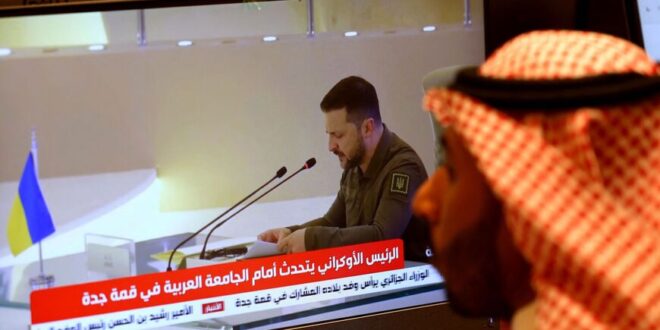Pro-Kyiv Western countries had failed to secure China’s presence at previous Ukraine peace talks.
China “participated actively” in Ukraine peace talks over the weekend at a summit in Jeddah, Saudi Arabia, that brought together senior officials from Kyiv, the West and developing countries, according to reports. Beijing is reportedly keen on progressing to a third round of talks as it emerges as a major player in the bid to end 18-month war.
Until now, pro-Kyiv Western countries had failed to secure China’s presence — seen as the ultimate diplomatic prize, given its power — at previous Ukraine peace talks, including the most recent meeting in Copenhagen on June 24.
The Guardian reported Sunday that an EU source said that at the Jeddah talks, China “participated actively and was positive about idea a third meeting at this level.”
China’s foreign ministry said Monday that the talks helped “consolidate international consensus” regarding how to address the Ukraine crisis, Reuters reported.
Chinese Special Envoy for Eurasian Affairs and former ambassador to Russia Li Hui attended the summit in Jeddah. Li “had extensive contact and communication with all parties on the political settlement of the Ukraine crisis… listened to all sides’ opinions and proposals, and further consolidated international consensus,” the Chinese ministry of foreign affairs said in a statement to Reuters.
A Ukrainian source who attended the talks told Al Arabiya and Al-Hadath that several countries supported the proposals presented. The two channels reported that there was more support for Ukrainian President Volodymyr Zelenskyy’s 10-point peace plan in Jeddah than in Copenhagen. That news will be welcome in Saudi Arabia, which is trying to position itself as a global mediator vis-a-vis the Ukraine war.
Andriy Yermak, head of Zelenskyy’s office, said in a statement that Ukraine had very productive consultations on the key principles peace should be built on.
“We had an extremely honest, open conversation, during which representatives of each country could voice their position and vision,” he said. “There were different views, but all the participants demonstrated their countries’ commitment to the principles of the UN Charter, international law, and respect for the sovereignty and inviolability of the territorial integrity of states.”
Overall, representatives from more than 40 countries attended the summit in Saudi Arabia. The Jeddah talks were informal and did not produce an official statement from all the parties involved, which included Ukraine, the European Union, the United States, China, Saudi Arabia and BRICS countries including Brazil, India and South Africa.
Russia, also a BRICS member, was not invited to the meeting, but Russian and Chinese foreign ministers held a phone conversation where they spoke about Ukraine, the Russian foreign ministry confirmed Monday. Russian permanent envoy to international organizations in Vienna Mikhail Ulyanov added that the consultations in Jeddah made no sense without Russia’s participation.
China, a close ally of Russia, has refused to condemn the country for its full-scale invasion of Ukraine launched in February 2022. China has put forward a peace plan for Ukraine, but it has received a mixed reception. It does not include the condition that Russia should return Crimea to Ukraine. One of the conditions of Zelenskyy’s peace plan is that Russia returns Crimea, a territory it annexed in 2014, to Ukraine.
Saudi Arabia is the world’s largest producer of crude oil and China is its biggest customer. Riyadh has maintained close relations with Beijing and Moscow, sometimes working in concert regarding oil policy.
Beijing also brokered a detente between Saudi Arabia and its main regional foe Iran in March as China emerges as a major diplomatic power in the region.
Zelenskyy did not attend the talks in Jeddah but he was in Saudi Arabia in May for the Arab summit, where he accused some political leaders of turning “a blind eye” to the devastation of Russia’s invasion.
 Eurasia Press & News
Eurasia Press & News




